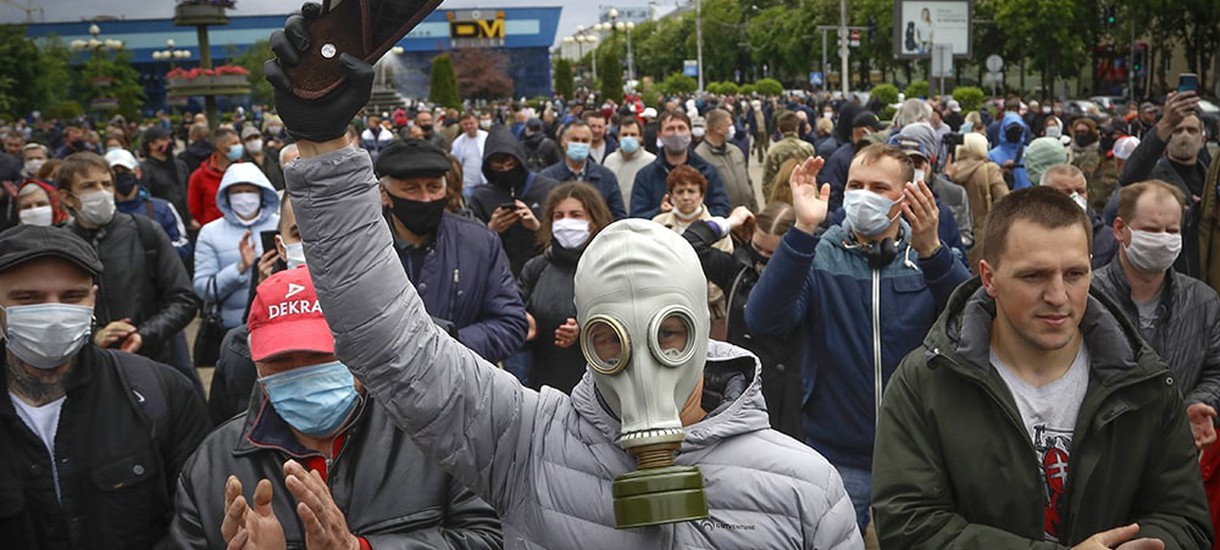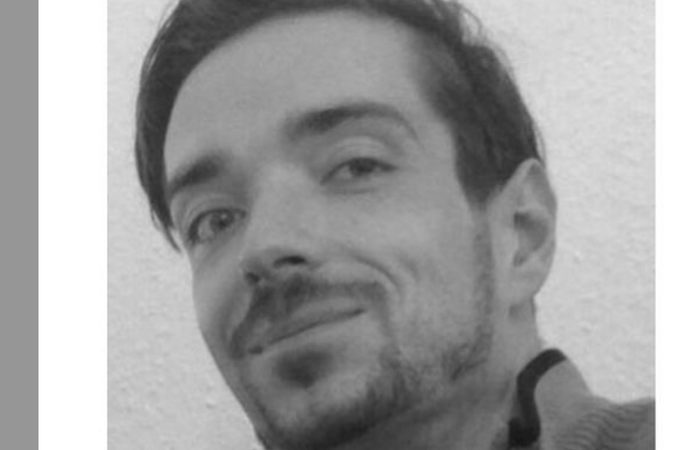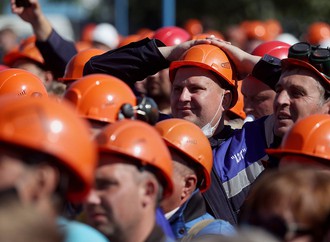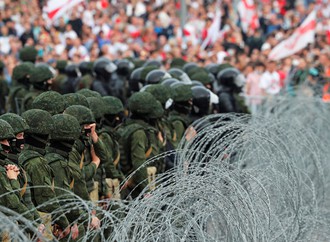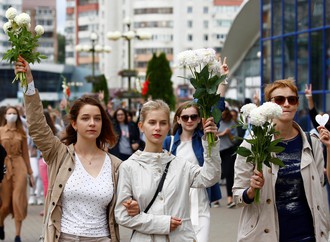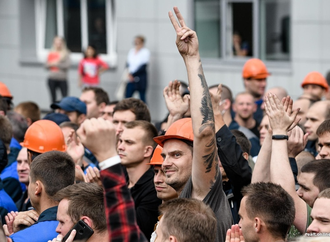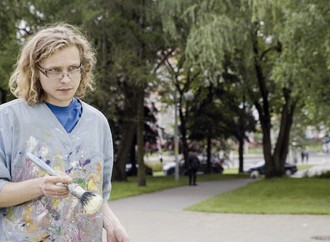Volodymyr Artiukh
At the onset of Covid-19, everyone in Belarus, including president Lukashenka, expected that the elections planned for 9 August would be at the very least boring. The country’s previous presidential campaign in 2015 was bleak and predictable, characterised by a cold truce which had set in between Belarus’ opposition, terrified by Russia’s activity in eastern Ukraine, and a state that had begun flirting with the west. Two years later, spontaneous outbursts of popular anger in Belarus quickly subsided following selective repressions, partial concessions and opposition weakness.
At the start of 2020, a hydrocarbon row with Russia and the Covid-19 pandemic seemed to absorb everyone’s energy, but the current electoral stand-off has, however, trumped everything. The western-supported old opposition, which has led an unsuccessful fight with the Belarusian government for 20 years, has largely withdrawn from proceedings. The contests’ initial challengers were unexpected: provincial video blogger Siarhei Tsikhanouski, former top manager at Belgazprombank Viktar Babaryka, and an ex-diplomat and head of an IT park, Valeri Tsepkala. The last two are renegades from Belarus’ top elite circles, a revolt not seen for 20 years.
The new protest movement has achieved a record geographic spread of mobilisation and rally attendance since the late 1990s. The state’s response has been equally unprecedented: repressions have been rapid and pre-emptive, bringing back memories of the first post-Soviet decade, with the main candidates disqualified before they could even enter the race. The partners of the three candidates - Sviatlana Tsikhanouskaya, Veranika Tsepkala and Maryia Kalesnikava - have now stood in for them, leading crowds of students, entrepreneurs and workers under the slogan “I/We are 97%”.
It would be futile to expect straightforward causal explanations for this turn of events. A “new Cold War” framing falters, as Lukashenka blames Russia for pulling the strings behind his opponents and sending “little green men” in the form of mercenaries, now detained in Minsk, while the new opposition demonstrates a certain “geopolitical promiscuity”, promising flourishing relations with all neighbours and avoiding divisive topics. The idea that this is a Belarusian “Maidan” haunts many, but on the ground everything looks different, if not the opposite of what happened in Ukraine in 2014.
Below I offer an analysis of long-term trends and conjunctural events that have overlapped in recent years to create the conditions for the current constellation.
The coronavirus conjuncture
Following Lukashenka’s typically populist attitude to coronavirus, both the opposition and the Belarusian authorities linked anti-government sentiments to the state’s response to the Covid-19 pandemic.
Opposition commentators joined western media in an orientalising ridicule of the Belarusian authorities’ decision to avoid lockdown, focusing on the president’s antics and ignoring the actual effort of the country’s healthcare system. Lukashenka was blamed for denying the threat of the virus; state agencies were accused of hiding the real scale of the pandemic and of lacking the capacity to fight it. By contrast, grassroots activism gained respect for helping Belarus’ healthcare system to cope. However, it has not been so much the epidemiological situation itself, as its economic and ideological consequences that have fuelled the current popular discontent.
As I explain elsewhere, Belarus has generally coped well with the spring wave of the pandemic due to fast roll out of its vast medical resources. Since June, the number of new infections has been going down, and now Ukraine, which introduced a draconian lockdown in March, lists Belarus as a “green” country alongside Sweden.
This is where the parallels with Sweden end. Although the Belarusian authorities kept the country open in order to preserve its economy, economic support measures were introduced belatedly - this put the main burden of the economic fallout on workers. While middle and small businesses were offered deferrals on interest payments and other preferential measures, the situation of workers in Belarus has worsened. Not only were there no additional payments to supplement falling wages, but employers were given the right to temporarily transfer their workers to other jobs or another employer on a short notice. People’s incomes also suffered from forced part-time work and forced vacations.
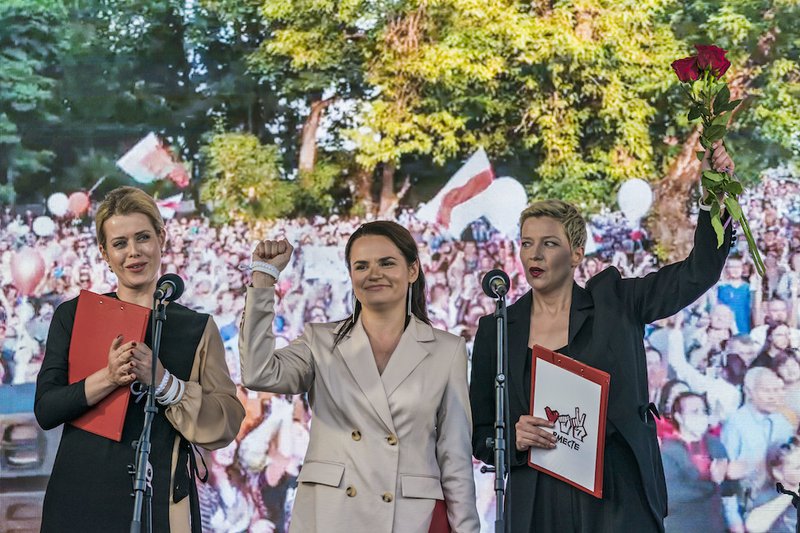
Veranika Tsepkala, Sviatlana Tsikhanouskaia and Maryia Kalesnikava | (c) Celestino Arce/NurPhoto/PA Images. All rights reserved
This epidemiological conjuncture has aggravated the longer trend of state-promoted work precarisation. This tendency started in 2004 with the introduction of fixed-term contracts, which now cover over 90% of Belarusian employees, a unique situation in the post-Soviet space. This trend was compounded by the introduction of a “social parasitism” tax in 2015 - an annual deduction for a long-term lack of official employment that seemed like a return to Soviet practices, but was meant to stimulate employment in the country’s low wage sectors and broaden its tax base. These and other employment flexibilisation measures were finally systematised in a new Labour Code adopted last year.
Thus, the Belarusian working class has been gradually deprived of bargaining power at workplaces and placed in direct dependency on the state and private employers. Although almost every worker belongs to the Federation of Trade Unions of Belarus, they rarely find protection from this state-affiliated body. The Federation’s chairperson Mikhail Orda is in charge of Lukashenka’s electoral team, which pushed some union members to leave the union in protest, as happened in 2011. Interestingly, in response to the current situation, the largest non-affiliated union has promised a miners’ strike.
In parallel, since 2009, the Belarusian authorities have accelerated their support of private initiatives, not least through Valery Tsepkala’s offshore High-Tech Park outside Minsk. For the last seven years, large industrial state enterprises have been laying off workers, who have, in turn, been picked up by the private sector, mostly in retail trade and services. The latter now account for 45% of Belarus’ labour force.
The opposition’s economic platform, which caters to supporters of Valeri Tsepkala and Viktar Babaryka but is rarely discussed publicly, offers a more radical and straightforward continuation of Belarus’ current policies through mass privatisation, further deregulation of employment and marketisation of welfare. However, these measures are disguised under populist rhetoric that is paradoxically drawn from the arsenal of the 2017 “parasite” protests against the state’s neoliberal tendencies.
Competing populisms
Three years ago, Belarus’ “non-parasite protests” were triggered by the state’s introduction of a tax on long-term unemployment. But these rallies were directed against state-imposed labour precarisation, dismantling of the welfare system and their ideological justification. Though perhaps a distant memory for some, today’s electoral campaign draws heavily on the 2017 “parasite tax” protests”.
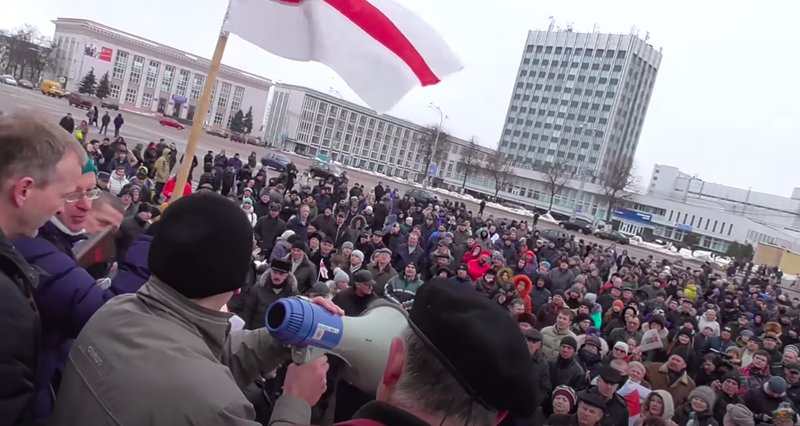
Protests against the "social parasite" law in Gomel, Belarus, 2017 | Source: YouTube / Garantii NET
As I argue elsewhere, 2017 was a populist protest against a neoliberal variation of state populism. This neoliberal inflexion of the dominant populist discourse developed simultaneously with the pro-business drift of the Belarus state, and imagined “the people” as entrepreneurial subjects who must “get undressed and work” instead of waiting for the state’s mercy (like the undeserving “social parasites”). The populist response of the protesters during the “parasite protests” consisted in asserting a more inclusive concept of “the people” who deserve respect and social rights by the very fact of their citizenship.
Belarus’ traditional opposition failed to appropriate the 2017 protests, but today’s electoral campaign bears a clear imprint of that “people’s populism” from three years ago. The now jailed blogger Siarhei Tsikhanouski, whose wife Sviatlana is currently the face of the opposition, continued the activity of his fellow blogger Maksim Filipovich, who gave voice to the protesters against the “social parasitism” tax in 2017. The main themes of the 2017 protests, the demands of dignity and economic inclusion, thus entered the current narratives of the opposition.
These narratives stress Lukashenka’s disdain for his voters, his derogatory phrases about a “a lazy, spoiled people”, and assert an inter-class unity under the banner of the “I/We are 97%” slogan. Svitlana Tsikhanouskaia’s recent talk on national TV re-enacted these themes: she said her husband Siarhei listened to “simple people” who live in dire conditions while their bosses drive expensive cars, and that’s why he was currently in jail.
Here, Tsikhanouskaia compared the Belarusian authorities to an abusive husband who “spent all your money while you were working, and then demands praise for it.” After a litany of complaints about the closure of enterprises and plummeting economy, she painted a picture of a better Belarus with higher wages, good jobs and decent pensions. It was as if Tsikhanouskaia had returned to Lukashenka’s electoral programme from 1994 - and promised to do everything better than him.
Domination without hegemony
Thus, Belarus’ new opposition is trying to challenge the president on his own terrain (broad popular appeal) and using his own tools - a cross-class and culturally diverse coalition united against corrupt politicians. But what is the relation of forces here?
The newly emergent slogan of “I/We are 97%” is the cry of the opposition form of populism that claims to represent the whole of Belarusian society without ethno-cultural divisions, appealing to workers as well as to real and aspiring entrepreneurs. It also implies that Lukashenka’s support is 3%, a number taken from online surveys conducted by pro-opposition websites. The presidential administration responded to this with the improbable claim that the incumbent enjoys 76% support. Neither number can tell much about the actual support for Lukashenka, let alone its quality and readiness to mobilise. The question of Belarusian authorities’ legitimacy has never been treated seriously: official analysts often talk about overwhelming support, whereas opposition activists were interested in downplaying it or blaming the “Sovietized” people. Percentage magic will remain a contented field for the clash of populist rhetorics.
Indeed, the very absence of public opinion data in Belarus is revealing as to the authorities’ legitimacy. While there are no publicly available surveys on political issues, some leaked sources signal 30% support for Lukashenka currently (one of the lowest numbers throughout his career) and comparable number for the opposition. One can hardly talk about Belarusians’ active support of the president, or about Lukashenka’s hegemony in the original Gramscian sense of the term - as a sort of moral and intellectual leadership in a class alliance. Instead, Lukashenka enjoys a vacillating minimal legitimacy, “domination without hegemony”, which Gramsci ascribed to Bonapartist regimes that rely directly on state power without representing a particular social class.
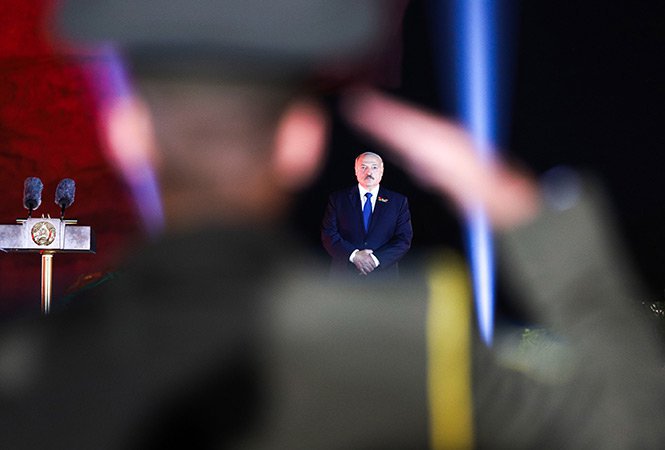
President Lukashenka | Source: President.gov.by
Indirect signs of this situation are electoral cycles that depend on immediate economic hand-outs, state policies balancing between various social groups, and sudden outbreaks of protests, to which the state reacts with a mixture of repression and concessions. So far, Lukashenka’s campaign has been sluggish and predictable, coverage of the state-owned media lifeless, meetings with prospective voters - far from numerous and enthusiastic. This drastically contrasts with the record number of signatures collected by the opposition campaigns in support of their candidates, and the opposition’s numbers and quality of mobilisation.
After the financial crisis of 2011, Belarus has been characterised by an especially brittle configuration of this “domination without hegemony”, and the past several months have revealed the ruling elite’s acute awareness of this situation. This explains the chaotic ideological coating of the repressions against protest participants and the opposition, the sudden changes in the president’s rhetoric, and his attempts to return to the election messages of 1994 - when he still enjoyed a genuine appeal. Lukashenka’s recently reshuffled inner circle staffed with siloviki, members of the security apparatus, remains loyal to him. But the departure of Babaryka and Tsepkalo, who have been highly integrated into the ruling elite since the 1990s and enjoy vast social capital not just in Belarus, but also Russia, may foreshadow further cracks in the state’s administrative and economic elite.
The elections of 9 August have unveiled the most serious political crisis in Belarus since Lukashenka was first elected 25 years ago. Several developments are to follow in the coming weeks. The authorities seem set to proclaim Lukashenka’s victory with a vote of around 80%. How far will the opposition go in challenging the results, given its unprecedented mobilisation capacity? Given that the opposition’s real leaders are in jail, will the leadership trio call for mass protests, or will they be willing to mitigate the popular drive for public disobedience? Will the general populist framework of the protest movement hold, or will it evolve in a more exclusive form under pressure of future repressions? What lessons will the presidential administration draw? What will be the ratio of repression and concession? And how will the west and Russia, unusually calm so far, react to these possible outcomes? In the current shifting circumstances, the answer to these questions is perhaps more difficult to anticipate than ever before.
First published in the openDemocracy
